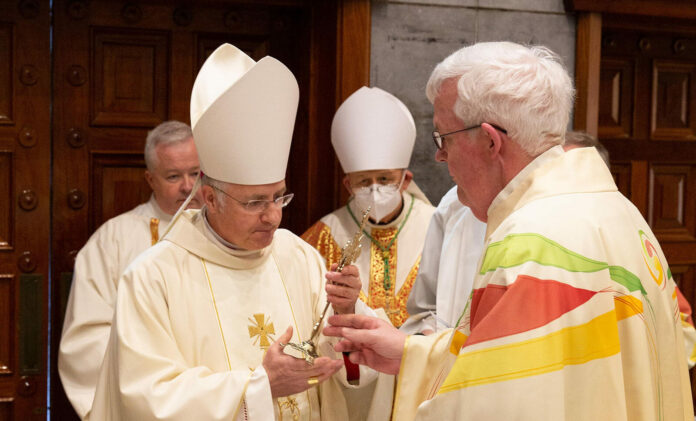MAY 1 saw the historic installation of Bishop Michael Duignan at Galway Cathedral, formalising his status as Bishop of Galway and Kilmacduagh and the Apostolic Administrator of Kilfenora. Bishop Duignan will to minister as Bishop of Clonfert.
The Roscommon native is the first Irish church leader to administer two Catholic dioceses. His dual-role, which was announced in February, was ratified on Sunday May 1. The ceremony was attended by Papal Nuncio Archbishop Jude Thaddeus Okolo Martin and Cardinal Seán Brady. In another first, the ceremony was live streamed on YouTube.
On the eve of the installation, a Vigil of Prayer in thanksgiving for the ministry of Bishop Brendan Kelly, who now retires, was held at the Church of the Immaculate Conception in Oranmore.
Because Bishop Michael Duignan was already a bishop, he was installed rather than ordained and he was principal celebrant, along with the Papal Nuncio, and homilist at Sunday’s ceremony.
Representatives of each of the parishes in the dioceses of Kilfenora, Kilmacduagh, Galway and Clonfert attended the installation, as did community members. Bishop Martin Drennan, bishop emeritus of Galway and Bishop John Kirby, bishop emeritus of Clonfert, also attended alongside Archbishop Eamon Martin, Archbishop of Armagh and Primate of All Ireland: Archbishop Dermot Farrell, Archbishop Kieran O’Reilly SMA; Archbishop Michael Crotty, Papal Nuncio to Burkina Faso and Niger; Bishops of the Western Province including Archbishop Emeritus Michael Neary and other Bishops. Representatives of the Church of Ireland, Methodist and Presbyterian communities also attended and Galway’s Islamic community and other faith traditions were also represented.
Pope Francis appointed Bishop Michael Duignan, Bishop of Clonfert, to minister simultaneously as Bishop of Galway, Kilmacduagh and Apostolic Administrator of Kilfenora on February 11. The Dioceses of Galway, Kilmacduagh and Kilfenora includes portions of counties Galway, Mayo and Clare, while the Diocese of Clonfert includes parts of counties Galway, Offaly and Roscommon.
Each diocese maintains its identity and handles its own cultural heritage as it deems fit. Each keeps its own personnel or can share with other dioceses; priests will not normally be asked to minister beyond their own diocese unless by a special request or mandate. Each diocese will also handle its financial administration independently and will make its own pastoral decisions as usual.
A spokesperson for the Irish Catholics Bishops’ Conference said that having one bishop for two diocese did not represent an amalgamation. “From the experience of other dioceses where this has been experimented, there is evidence that many factors enhance the future survival of the Dioceses, which unite and cooperate in persona episcopi,” they said. “This form of union under one bishop is not an amalgamation and does not suppress either of the two dioceses. It respects the autonomy and allows for the functionality of the individual jurisdictions. It is a mild and practical form of union between dioceses and can be a temporary or permanent provision.”
Bishop Duignan is a native of Athlone, and was born on July 15, 1970. He is the eldest of six children and attended Cloonakilla National School, Bealnamulla and Saint Aloysius College, Athlone. He studied for the Priesthood at Saint Patrick’s Missionary Society in Kiltegan, Co Wicklow, and at the Pontifical Irish College in Rome. He was ordained to the Priesthood for the Diocese of Elphin on July 17, 1994.

